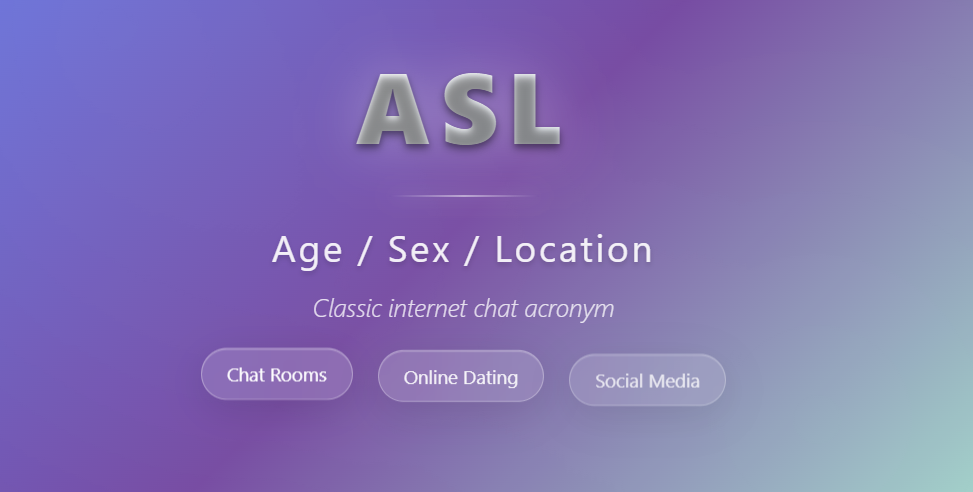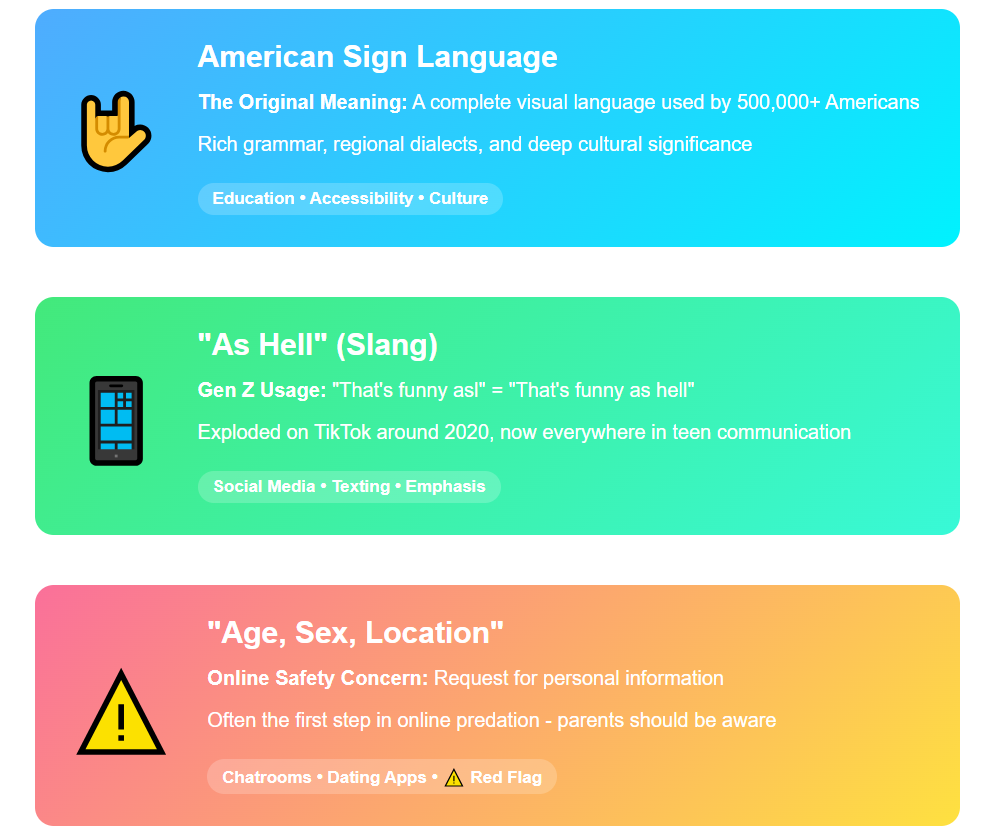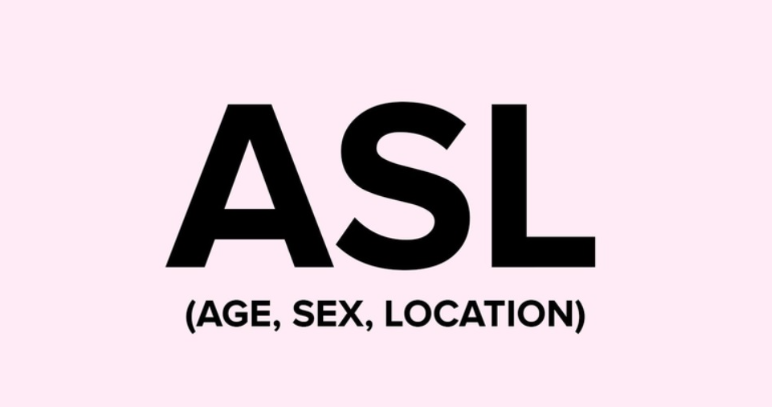Your teenager texts "I'm tired asl" and you're confused. Or you spot "ASL meaning?" in their DMs and feel concerned. You should be - ASL has 3 completely different meanings in 2025.
While it traditionally means American Sign Language, teens now use it as slang for "as hell." But there's a third meaning that demands parental attention: "age, sex, location" - a question predators use to target young people online.
Understanding these distinctions isn't just helpful; it's essential for your family's digital safety. Let's decode ASL together.

Table of Content
Part 1: What Does ASL Mean? All 3 Definitions Explained
Let's cut straight to what you need to know. ASL has three distinct meanings in 2025, each used in completely different contexts:

1. American Sign Language (The Original Meaning)
ASL originally stands for American Sign Language, a complete visual language used by over 500,000 people in the United States. It's not just hand gestures - it's a rich language with its own grammar, regional dialects, and cultural significance. When you see ASL in educational contexts, disability services, or cultural discussions, this is what it means.
2. "As Hell" (The TikTok Slang)
This is probably why you're here. On TikTok, Instagram, and in text messages, ASL means "as hell." When teens type "that's funny asl" or "I'm hungry asl," they're emphasizing how funny or hungry they are. It's everywhere in Gen Z communication - comment sections, captions, DMs, you name it. This usage exploded around 2020 and shows no signs of slowing down.
3. "Age, Sex, Location" (The Dangerous One)
This is where parents need to pay attention. In chatrooms, dating apps, and online games, "ASL?" is a request for personal information. It seems innocent - just basic details about who you're talking to. But child safety experts warn this seemingly casual question is often the first step in online predation. When strangers ask for ASL, they're building a profile that helps them target vulnerable young people.
The context tells you everything. ASL at the end of a sentence? Probably slang. ASL as a question from someone you don't know? Red flag. ASL in a conversation about accessibility or education? Sign language. Understanding these distinctions isn't just helpful - it's essential for navigating today's digital landscape safely.
Part 2: ASL Meaning in Text and Social Media - The Most Common Usage
The usage varies slightly by platform. On TikTok, it's mostly in comments and captions. Instagram users drop it in stories and DMs. Snapchat sees it in quick exchanges between friends. Text messages probably have the highest concentration, where teens use it naturally in conversation.
Here Is a Table: ASL Usage Across Different Platforms
| Platform | Usage Context | Example |
| TikTok | Comments | "This dance hard asl" |
| Stories and DMs | "You look cute asl" | |
| Snapchat | Quick exchanges between friends | "I'm tired asl" |
| Text Messages | Natural conversation flow | "That test was hard asl" |
Understanding context helps parents decode teen messages without overreacting. "You weird asl" is just teen banter, while "asl?" from a stranger requires immediate attention.
Part 3: When ASL Becomes Dangerous - What Parents Need to Know
Now we need to talk about the ASL that keeps child safety experts up at night. When someone types "ASL?" in a chatroom, game, or social platform, they're not interested in sign language or teen slang. They want three specific pieces of information that, combined, can put your child at risk.
- Age: Identifies vulnerability level
- Sex: Allows tailored manipulation
- Location: Enables real-world contact

Combined, these create a predator's roadmap. "14/F/Chicago" tells them exactly who and where their target is.
The Federal Trade Commission reports that online predation often follows predictable patterns, and ASL requests are frequently the opening move. After getting this information, predators typically:
- Create fake identities that appeal to their target's age group
- Claim to live nearby to suggest potential meetings
- Use location details to seem knowledgeable about the victim's area
- Gradually isolate targets from parents and friends
Teens often answer ASL requests without thinking because it seems normal. They don't want to seem rude. Predators know this and use guilt tactics: "I told you mine" or "Don't you trust me?"
Real consequences follow. Teens discover their "16-year-old friend" is actually a 40-year-old adult who used their ASL to build fake trust. Some predators manage dozens of fake profiles targeting specific demographics.
The golden rule: Real friends already know your ASL. Strangers asking for it = immediate red flag.
FamiSafe Social App Detection feature helps by detecting grooming patterns beyond simple keywords - repeated ASL requests, personal data fishing, or attempts to move chats elsewhere. You get instant alerts when these red flags appear. But remember, technology supports conversation, not replaces it. Use FamiSafe as a safety net while keeping communication open with your teen.
- Set Screen Time & App Rules
- Capture Instant or Scheduled Screenshots
- Web Filter & Safe Search
- Location Tracking & Driving Report
- App Blocker & App Activity Tracker
- YouTube History Monitor & Video Blocker
- Social Media Texts & Porn Images Alerts
- Available on Multiple Platforms
Conclusion
ASL meaning reflects how complex digital communication has become. While "as hell" is harmless teen slang and American Sign Language enriches communication, the "age/sex/location" usage poses real dangers.
Now that you understand these differences, talk with your teens. Share what you've learned and establish safety boundaries together. Consider tools like FamiSafe for extra protection, but remember - your awareness and involvement matter most in keeping kids safe online.


